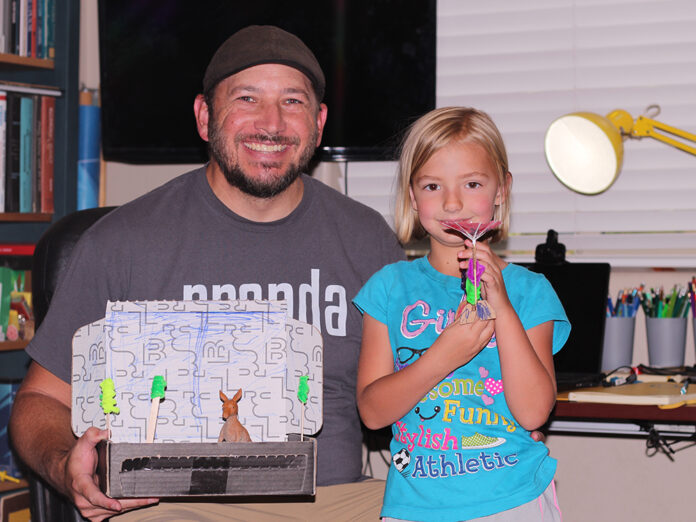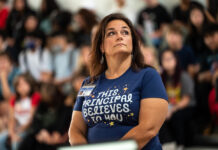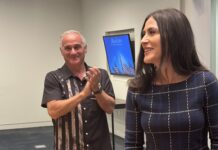
In August 2019, Tom Bogle opened a microschool in Maricopa for a few students in grades 3-8 and was soon joined by a neighbor who agreed to start one for grades K-2.
This school year about 200 students will attend school with Prenda learning “guides.”
The big jump in enrollment occurred in summer 2020 when some parents, frustrated by the virtual learning-from-home brought on by the COVID-19 pandemic, started looking for options to get their children back to in-person schooling. Prenda’s small-group approach provided an alternative, and even though Prenda went virtual for a time, his student’s technology prowess made it easier on them, Bogle said.
Three Prenda microschools were operating in the city in May 2020. But that number ballooned to 25 microschools by the opening of the 2020-2021 school year. An average of eight students attend each school, typically in the homes of their guides.
Bogle, a resident of Glennwilde, had been in education more than a decade when he started the process of building a different learning model. In his research, he found Prenda offered an approach that was new and different.
“It was just about everything I wanted,” he said. “My goal, ultimately, was to start a high school. Prenda is only K-8 because building a high school is a very different beast. The accreditation process is very, very different from what it is for K-8 in every single state. My own children were mostly elementary age and so this was going to work great for my family.”
Bogle has four children in microschools and two at Heritage Academy. He and other parents appreciated how the Prenda model gives children more autonomy over their learning and a say in how they approach their education. In fact, more than half the parents who had children in Bogle’s microschool went on to become Prenda guides themselves.
By leveraging the use of technology for academics, guides — they are not called teachers — can focus on the social aspects of learning, helping students deepen connection and human relationships and providing them emotional support, Bogle said.
“Because that’s what humans do really well,” he said. “The technology just can’t do that right now.”
‘TEACHING IS IMPOSSIBLE’
Prenda grew out of founder and CEO Kelly Smith’s desire to have his children learn computer programming as part of their education. Not wanting them to have to learn it on their own, he enlisted a group of volunteers and kids and started a coding class at Mesa Public Library in 2013.
As he watched children work on projects each week at Code Club, he soon realized two things: learning is a choice and teaching is impossible.
Bogle said Smith, an MIT graduate, saw there could be a better way.
“That led to the idea of, ‘Hey, can we apply these different lessons that we’ve learned from here into an education system,” he said. “Can we build a different learning model that takes advantage of this idea that kids actually are much more motivated to learn when you empower them to take more control over their learning.’”
Smith started the company in 2015 and three years later opened a microschool in his home for seven neighborhood children. Today, more than 4,000 children in 12 states are learning in Prenda schools.
The company helps parents and others operate microschools by partnering with regulated, state-credentialed educational institutions to engage small groups of 5-10 students in mastery-focused, project-based learning.
In Arizona, Prenda partners with Edkey Inc., which operates Sequoia Pathway Academy in Maricopa. In April, the Arizona Attorney General’s Office launched an investigation into the relationship between Prenda and EdKey that allows to educate children in the home with little regulation.
The attorney general is looking at the arrangement in which EdKey enrolls the microschool students in its online school and collects charter school funding from the state. As a result, Arizona students can attend Prenda for free.
“Our partnership with regulated, licensed education institutions was recently reviewed by the Arizona Charter Board and the Arizona Attorney General’s office,” Prenda said in a statement. “We were happy to cooperate with these inquiries, as they represented an opportunity for Prenda to demonstrate how seriously we take our responsibilities to the communities in which we live, learn, and work. We are likewise happy to report that both the Charter Board and the Attorney General gave us a clean bill of health and we look forward to continuing our working relationships with both.”
CONQUER, COLLABORATE, CREATE
The schools are generally structured in grades — K-2, 3-5 and 6-8 — with students in similar stages of academic and emotional development.
Kim Park of Maricopa said Prenda has been a positive experience for her daughter, Taylor, 12.
With Taylor setting her own pace, she feels less stress and more confidence while making strides academically, Park said.
“They have to master their work before moving on,” Park said. “That has helped her.”
There are three main learning modes in the Prenda school day — Conquer, Collaborate and Create.
School starts with a community circle to help students build social and emotional connections with each other through interaction, but in a way to identify each other’s ambitions and goals. Learning goals are set for the day.
In Conquer mode, students work on core academic subjects through online programs that adapt to their performance and require mastery before moving on, Bogle said.
Student-led group learning activities are the focus in Collaboration mode. Every student is invited to participate and contribute to the best level they can on activities around science, history and other core academic subjects the kids aren’t working on individually during Conquer time, he said.
The Create mode features projects designed to show kids creativity is a part of the learning process and the learning process itself is inherently creative, according to Bogle.
Students can work on projects independently in small groups, with most designed to be completed in two or three days and build a portfolio of creative projects to demonstrate their independent learning.
The day ends with a brief reflection meeting, where the children share their biggest victory or challenge of the day.
“We cheer for the kids’ wins and we share their successes,” he said. “We also cheer for their struggles because it’s in their willingness to take on that challenge where the real learning takes place.”
FOUNDATION FOR LIFE
Bogle sees the model as a foundation for students to guide them the rest of their lives.
“It’s so much more empowering to teach kids those skills at a young age so that they can start that work much earlier, rather than someone like myself who had this awakening in his early 30s, saying ‘This life that I’ve built for myself is not really what I want’ and having to completely transition” he said. “They’re constantly working toward a life of deeper purpose for themselves.”
Bogle did not lead a microschool during the last school year, taking a different role with the company that includes exporting the Prenda model to additional states. Currently, he is working with educational partners in Kansas, Louisiana and Arkansas to help set up pilot programs.
“Here in Maricopa, we have some great public schools and some great charter schools,” he said. “But Prenda is not just a different schooling environment, it’s a different learning environment that takes the institutional design of school and restructures it.”
A big believer in Prenda, he said it is not the right fit for everyone. Some will try it out and decide it is not for them.
“That’s fine,” he said. “We’re not trying to be everything for everyone.”
TOM BOGLE
Age: 42
Hometown: Chandler (though my father used to farm out here and my grandfather worked in Maricopa after WWII
Occupation: Microschool guide training manager for Prenda
Community: Glennwilde
Family: Natalie and I will have been married for 20 years this November. We have six children ages 5-17.
Education: Master’s degree in education from ASU
Favorite subject in high school: History, economics
Learning philosophy: Start with heart. Figure it out. Build a foundation of trust. Dare greatly. Choose learning over comfort. Learning is a messy process of trial and error, reflection and reiteration. Trust children to want to learn, then give them the space to do so.
This story appears in the August issue of InMaricopa magazine.

![MHS G.O.A.T. a ‘rookie sleeper’ in NFL draft Arizona Wildcats wide receiver Jacob Cowing speaks to the press after a practice Aug. 11, 2023. [Bryan Mordt]](https://www.inmaricopa.com/wp-content/uploads/2024/04/cowing-overlay-3-218x150.png)




![Maricopa’s ‘TikTok Rizz Party,’ explained One of several flyers for a "TikTok rizz party" is taped to a door in the Maricopa Business Center along Honeycutt Road on April 23, 2024. [Monica D. Spencer]](https://www.inmaricopa.com/wp-content/uploads/2024/04/spencer-042324-tiktok-rizz-party-flyer-web-218x150.jpg)





![Alleged car thief released without charges Phoenix police stop a stolen vehicle on April 20, 2024. [Facebook]](https://www.inmaricopa.com/wp-content/uploads/2024/04/IMG_5040-218x150.jpg)

![MHS G.O.A.T. a ‘rookie sleeper’ in NFL draft Arizona Wildcats wide receiver Jacob Cowing speaks to the press after a practice Aug. 11, 2023. [Bryan Mordt]](https://www.inmaricopa.com/wp-content/uploads/2024/04/cowing-overlay-3-100x70.png)


